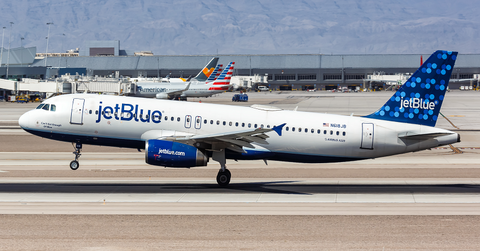JetBlue Stock: Analysts’ Ratings and Target Prices
With a year-to-date return of 21.9%, JetBlue Airways (JBLU) stock is one of the airline industry’s top performers. Here are analysts’ views on the stock.
Nov. 15 2019, Published 12:04 p.m. ET

With a year-to-date return of 21.9%, JetBlue Airways (JBLU) stock is one of the airline industry’s top performers. The stock has outperformed the Dow Jones and iShares Transportation Average ETF (IYT), which are up 19.1% and 18.3%, respectively, this year.
Meanwhile, many of JetBlue’s peers have failed to keep up with the broader market. Spirit Airlines (SAVE) and American Airlines (AAL) have been the weakest, falling 35% and 10.4%, respectively, this year. In contrast, Southwest Airlines (LUV) has risen 24% this year, and Delta Air Lines (DAL) and United Airlines (UAL) have risen 13.3% and 10.4%.
Analysts’ views on JetBlue stock
Analysts are optimistic about JetBlue’s near-term performance. And after the company’s third-quarter earnings release on October 22, they became more bullish. Before the announcement, about 33% of analysts covering JetBlue suggested “buy.” That proportion now stands at 50%. Their average target for JetBlue has also increased, by 5.7% to $21.81. The target price implies an 11.5% upside over the next year.
On November 13, UBS analyst Myles Walton initiated coverage of the stock with a “buy” rating. He thinks JetBlue stock could reach $25, implying a 28% upside from its closing price of $19.57 yesterday. Barron’s reports Walton’s earnings estimate is higher than Wall Street’s average forecast. He expects other analysts to also raise their earnings estimates, which could further boost JetBlue stock.
JPMorgan Chase analyst Jamie Baker is also optimistic about JetBlue. The analyst is impressed with the company’s fiscal 2020 earnings outlook, and believes JetBlue could continue beating Wall Street’s expectations. On October 28, the analyst upgraded the stock to “overweight” from “neutral” and raised its target price by one dollar to $24. Other target price increases for JetBlue stock after the company’s Q3 results were as follows:
- Morgan Stanley increased its target by approximately 11% to $21.
- Evercore ISI raised it to $24 from $21.
- Cowen raised its target price by a dollar to $20.
Impressive cost-saving initiatives
The company’s efficient cost management seems to be driving its earnings higher. Through its structural cost program, JetBlue intends to save $250 million–$300 million in ex-fuel costs annually through 2020. In last year’s fourth-quarter results, JetBlue revealed it had saved $199 million through the program.
Moreover, in this year’s third quarter, the company’s ex-fuel operating expenses rose less than expected. JetBlue’s ex-fuel cost per available seat mile rose 0.3% year-over-year, whereas it had guided for a 0.5%–2.5% increase.
